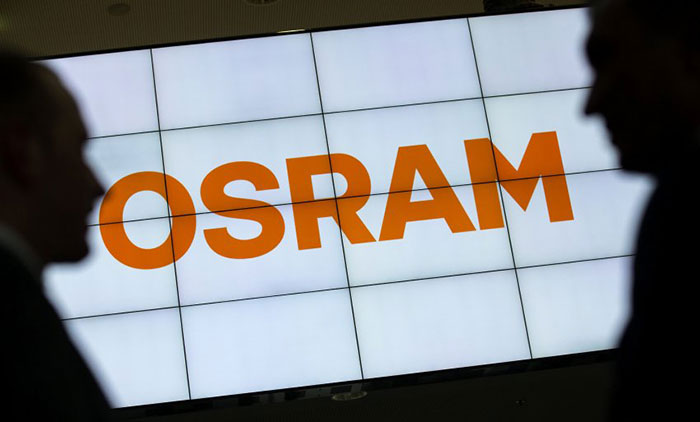After a challenging fiscal year 2019, Osram has made a robust start to fiscal 2020. On a comparable basis, revenue in the first quarter (ending December) grew slightly by 0.5 percent to 873 million euros. The adjusted EBITDA margin increased on a comparable basis by nearly two percentage points to 13.0 percent. The semiconductor business, in particular, showed a significant recovery in margins. Adjusted EBITDA climbed by more than 22 percent to 114 million euros within a year. This development is due to the Osram performance programs, higher production volumes and positive effects from the change to IFRS 16 accounting standard. “The performance programs initiated at an early stage had a lasting effect in the first quarter,” said Olaf Berlien, CEO of OSRAM Licht AG.
The important sales markets for Osram developed economically as expected from October to the end of December. It was therefore essential for Osram’s management to take timely and consistent countermeasures. These steps are clearly reflected in the figures of the individual business segments.
Revenue in the business segment Opto Semiconductors was roughly stable and amounted to 359 million euros. The operating margin in the first quarter was in line with earlier figures. The segment achieved an adjusted EBITDA margin of 24.5 percent, compared with 19.5 percent in the prior-year quarter.
In the segment Digital, revenues climbed by more than 2 percent to 217 million euros within a one-year period. Adjusted EBITDA reached the break-even point following a loss of minus 10 million euros in the previous year.
In the segment Automotive, the economic situation remains uncertain. Revenue increased comparatively by 0.7 percent to 480 million euros. Adjusted EBITDA was at the previous year’s level of 47 million euros.
Considering the still uncertain economic outlook in the customer industries, the Osram Managing Board confirms its existing forecast for the current fiscal year: Revenue is expected to be between minus and plus 3 percent compared to the previous year. The adjusted EBITDA margin is estimated at 9 to 11 percent. Free cash flow is expected to be positive, potentially in the mid-double-digit million range.
Osram will hold a conference call for analysts with the Company’s Management Board on Thursday, February 6, starting at 2:00 p.m. CET. It will be broadcast online at https://87399.choruscall.eu/links/osram200206ir.html. A recording of the call also will be available at this address.
The corresponding documentation can be found here: https://www.osram-group.com/en/investors/publications/2020
Selected key figures for the OSRAM Licht AG (continued operations) in the first quarter
| 1st quarter 2020 | 1st quarter 2019 | Nominal Change | |
| Revenue | 873 | 828 | 5.5% |
| Comp. revenue growth1 | 0.5% |
||
| Adjusted EBITDA2 | 114 |
93 | 22.2% |
| …Margin | 13.0% | 11.3% | 180bps |
| Profit after taxes | 1 | (5) | n.a. |
| Free Cash Flow | 7 | (101) | n.a. |
| ‘000 Employees | 23 | 26 | (12.1%) |
(Provisional, unaudited figures. Figures in millions of euros, margins in percent, employees as on December 31. Negative values in parentheses.)
(1adjusted for currency and portfolio effects)
(2Adjusted for special items including e.g. transformation costs, significant legal and regulatory issues, as well as M&A-related costs.)Development of the reporting segments in the first quarter
| 1st quarter 2020 | 1st quarter 2019 | Nominal change | |
| Opto Semiconductors | |||
| …Revenue | 359 | 352 | 1.8% |
| …comp. revenue growth1 | (0.7%) | ||
| …adjusted EBITDA2 | 88 | 69 | 28.2% |
| …Free Cash Flow | 36 | (24) | n.a. |
| Automotive | |||
| …Revenue | 480 | 445 | 7.9% |
| …comp. revenue growth1 | 0.7% | ||
| …adjusted EBITDA2 | 47 | 48 | (2.9%) |
| …Free Cash Flow | (17) | (7) | n.a. |
| Digital | |||
| …Revenue | 217 | 207 | 4.5% |
| …comp. revenue growth1 | 2.2% | ||
| …adjusted EBITDA2 | (1) | (10) | n.a. |
| …Free Cash Flow | (7) | (48) | n.a. |
(Provisional, unaudited figures in millions of euros. Negative values in parentheses.)
(1adjusted for currency and portfolio effects)
(2Adjusted for special items, including e.g. transformation costs, significant legal and regulatory issues, as well as M&A-related costs.)
